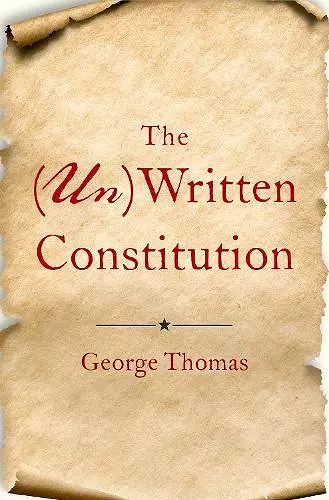The (Un)Written Constitution
Format:Hardback
Publisher:Oxford University Press Inc
Published:5th Jan '22
Should be back in stock very soon

Illuminates the unwritten ideas that underlie our deepest debates about the written Constitution. The late Justice Scalia relished pointing to departures from the written text of the Constitution as a departure from Constitutional law itself, but in fact his own jurisprudence relied on unwritten ideas. Given that Scalia's "textualist" approach to constitutional interpretation has become even more prominent in recent years with the elevation of Justices Gorsuch, Kavanaugh, and Barrett--all jurists in the mold of Scalia--to the Supreme Court, it is crucial that the public understands that these textualists all rely on unwritten ideas when they interpret the Constitution. Indeed, our most intense debates about America's written Constitution are not about constitutional text, but about the unwritten ideas and understandings that guide our reading of the text. In The (Un)Written Constitution, George Thomas makes these ideas visible by turning to the practices of Supreme Court justices and political actors in interpreting the Constitution over more than two centuries. From founding debates about freedom of speech and religion to contemporary arguments about judicial review, the separation of powers, same--sex marriage, and partisan gerrymandering, he highlights the too--often unacknowledged ideas that animate our debates about the written Constitution. Contrary to the self-identified textualists, Thomas argues, these recurrent debates are not about whether to follow the text. Rather, they are disputes about what fidelity to the text requires. Illuminating how moving beyond the text is an inescapable feature of interpreting the written Constitution, this concise primer on constitutional interpretation forces us to consider the text--and the unstated principles that lie beneath it-in a new light.
I think this book will be an excellent supplement for students working their way through the canon of constitutional law and trying to understand why and how the constitution and its meaning evolve over time, even when the text does not change. In my experience,the best reads are the ones that leave us with burning questions for future scholars and thinkers to resolve. The (Un)Written Constitution certainly accomplishes that. * Amanda Hollis Brusky, Review of Politics *
The (Un)Written Constitution is a thoughtful, well-written slim volume that I could easily see assigning in an advanced undergraduate constitutional law course. Indeed, by paying close attention to Thomas's arguments, students will surely emerge as more confident constitutional interpreters in their own right and enhance their understanding of the necessity of exploring the principles that underlie the opinions of the justices. * Kevin J. McMahon, Trinity College, Perspectives on Politics *
The (Un)Written Constitution involves Thomas's careful elucidations of the reasoning of judges on both sides of the political divide in a series of well-known Supreme Court decisions, from the nation's inception to the present * KEN I . KERSCH, American Political Thought *
Before turning to the substance of Thomas' arguments, it is important to note that this book is extremely well-written and accessible enough for well-informed non-lawyers but also sufficiently sophisticated to appeal to constitutional law professors—no easy trick. Above all, Thomas does a masterful job presenting opposing arguments in their strongest lights before he tears them down. He takes textualist arguments seriously, even when he rejects them, which is exactly how a scholar should treat counterarguments. * Eric Segall, Georgia State University College of Law, The New Rambler *
The (Un)Written Constitution is a marvelously concise and myth-busting account of America's central constitutional debates. By proving beyond dispute that all constitutional interpreters must rely on unwritten assumptions and political theories to make sense of the constitutional text, Thomas helps lift the fog of confusion that shrouds so much constitutional controversy. A must read for judges, students, and citizens: all who seek to understand the meaning of our founding texts. * Stephen Macedo, Laurance S. Rockefeller Professor of Politics and Human Values, Princeton University *
All constitutional interpretation begins somewhere within the four corners of the text. But as George Thomas argues in this crisply written, astute, and occasionally ironic analysis, how jurists read and interpret that text always rests upon some set of notions about the political theory of the Constitution, the moral values embedded in it, and a host of other ideas about the enterprise of legal interpretation. For Thomas, these are the '(un)written' parts of the Constitution that appear nowhere in its text but that permeate the whole messy enterprise of interpretation that he deftly dissects. * Jack Rakove, William R. Coe Professor of History and American Studies, Emeritus, Stanford University *
Thomas argues that textualists and originalists, no less than living constitutionalists and moral readers, make judgments based on unwritten understandings of the Constitution-debatable interpretations of its fundamental concepts, principles, and commitments, as well as of the underlying political theory embodied in the Constitution. Thus, contrary to common assertions, our disagreements in constitutional interpretation are not between those who stick to the text and those who go outside it. This is a timely, accessible, and compelling book. * James E. Fleming, The Honorable Paul J. Liacos Professor of Law, Boston University School of Law *
This book persuasively shows that our central constitutional disagreements are not about the written text, but about unwritten ideas and understandings. Thomas succeeds in showing that this distinction between the unwritten and written is a misleading one and that the Constitution is most notably a work of applied political theory. All justices appeal to the underlying political theory of the document, a theory that in many cases they often disagree about. The book nicely draws on historical and contemporary examples to advance this argument. * Sonu Bedi, Joel Parker 1811 Professor in Law and Political Science and Professor of Government, Dartmouth College *
ISBN: 9780197555972
Dimensions: 149mm x 216mm x 19mm
Weight: 336g
184 pages